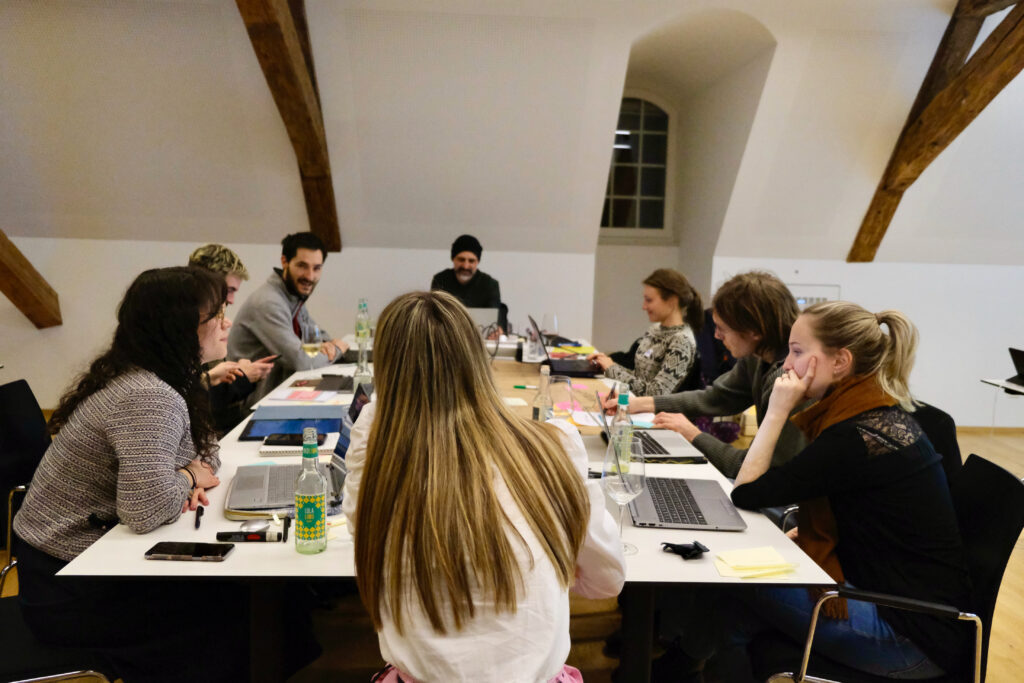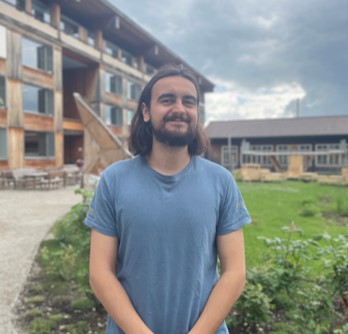This blog article on sustainable and inclusive leisure is part of a four-part blog series created with masters students receiving a Hirschmann foundation scholarship. The goal for the multidisciplinary group of future decision-makers was to develop visions on where sharing economy approaches could be implemented to improve our society as a whole.
Authors: Elsa Jeanfavre, Arthur Thirion, Alexandre Rey, Katja Pott, Jan Wächter, Hae-Sup Sin, Mathujah Manikkan and Jaromir Kunzelmann
Cover Image: Linn Nora Henz (2023)
Bringing together 27 young thinkers from a variety of academic fields, we used Policy Kitchen to dive into sharing economy approaches. The result is a four-part blog series on areas of life where we can share more today, to leave behind a world worth living for the generation of our grandchildren. This project is made possible by the Hirschmann foundation.
Leisure is an essential human activity, as a life without leisure is a bleak perspective. The Universal Declaration of Human Rights recognises “the right to rest and leisure” for everyone in its Article 24. Thus, when we think of new ways of living together, such as a just sharing economy, we should not forget to consider leisure in all its forms. To this end, we will focus on harnessing three key aspects of the sharing economy: affordability, accessibility, and sustainability for leisure activities.
Affordability
Access to various forms of leisure is hindered by a growing imbalance of wages and expenditures. Sharing leisure activity equipment is one possible way to democratise all forms of leisure by bringing down costs for people with different financial means and avoiding hobby items lying around idly the majority of the time. The duplicate expenditures economised through sharing could fund programmes such as subsidising cultural events for low-income families, sponsoring school trips for underprivileged children or improving the environmental footprint of leisure activities.
Regarding community equipment, a multitude of co-benefits are expected. Not only would the burden of purchase and maintenance be shared, but making certain activities more accessible could also help foster a sense of community. For instance, a group of people could purchase mountaineering gear together and run community maintenance workshops. Future purchases would be made based on a consensus on what is needed. This would also help reduce the environmental impact of most sporting equipment. Sports gear is often purchased for individuals, underutilised by the owner or replaced before its end of usability due to changing practices within the sports (for example, new technologies such as foils replacing classic windsurfing boards) or disinterest in the activity.
Accessibility
Regarding leisure activities for disabled people, we should aim for a near-zero exclusion rate and break down existing barriers to accessibility. To this end, the sharing economy presents an opportunity to forge a future characterised by comprehensive inclusivity. Here, we focus on the sharing of both experiences and equipment. Experience sharing would occur via platforms or informal groups where disabled people could try out new sports with others in safe environments, and on the flip side, the platform could also allow able-bodied people to experience sports adapted for people with disabilities such as blind football or wheelchair basketball. This would help facilitate understanding on both sides, create more awareness among the general population and thereby gather support for disability-friendly political concerns.
Regarding sharing equipment, this could refer both to the cost and the equipment itself. To mitigate costs, we draw from our leisure redistribution proposal, wherein sports club memberships play a role in funding and sustaining adapted versions of respective sports. Concerning physical equipment, communities could help create a robust sharing system, ensuring these often expensive and bespoke equipment are readily available to all people requiring them.
Sustainability
Leisure activities are not without environmental impact, be it carbon emissions or biodiversity degradation. When it comes to carbon emission, nearly 50% of emissions for leisure tourism is due to travel to and from destinations. This share could be reduced through targeted policy measures subsiding sustainable modes of transportations or incentivising mobility sharing. The private sector has presented even bolder ideas, such as the Climate Perks accreditation program which allows companies to offer additional paid journey days when employees choose a train, coach or boat for holiday travel.
Digital technologies could also be harnessed to virtually experience exotic locations or natural reserves from the comfort of one’s home, thereby reducing both the carbon and biodiversity impact. Previously exclusive, dangerous or environmentally harmful travel experiences could be harmlessly enjoyed by many through a virtual reality headset. Children can see and learn about animals from all over the world through VR headsets instead of zoos. This is already a relatively popular idea, with a petition to use VR to replace holding gorillas in captivity collecting over 70,000 signatures.
These ideas have demonstrated how a just sharing economy can be harnessed to increase the affordability, accessibility, and sustainability of leisure. Through sharing economy approaches, we can not only enrich individual’s lives but also create a more harmonious and inclusive society. This not only benefits the current generations but also aids in safeguarding the well-being of our planet for the future.
We thank the Hirschmann foundation for their kind support of this four-part blog series on sharing economies.









